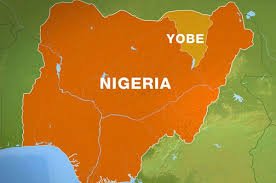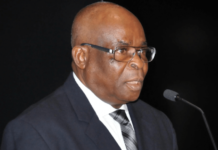
Boko Haram drove scores of kidnapped Nigerian schoolgirls
back into the town where they had been captured a month ago and abruptly
set them free on Wednesday.
The captors gave no reason
for their release, but Nigeria denied that a ransom had been paid.
Several of the girls said some of their friends had died in captivity
and one was still being held.
The fighters from the Boko
Haram group, some shouting ‘God is greatest’, drove the girls back into
the northeast town of Dapchi in a line of trucks in the morning,
dropped them off then left, witnesses told Reuters.
Haram group, some shouting ‘God is greatest’, drove the girls back into
the northeast town of Dapchi in a line of trucks in the morning,
dropped them off then left, witnesses told Reuters.
“I
don’t know why they brought us back but they said because we are
children of Muslims,” one of the freed girls, Khadija Grema, told
Reuters.
don’t know why they brought us back but they said because we are
children of Muslims,” one of the freed girls, Khadija Grema, told
Reuters.
Aliyu Maina, reunited with his 13-year-old
daughter, said the fighters “stopped and blocked the road, they didn’t
talk to anybody, they didn’t greet anybody.”
daughter, said the fighters “stopped and blocked the road, they didn’t
talk to anybody, they didn’t greet anybody.”
“They said people should make space for people to recognise their children and I got my child.”
Boko
Haram has waged a nine-year insurgency in northeast Nigeria and
neighbouring states that has seen tens of thousands of people killed,
more than 2 million displaced and thousands abducted. A 2015 military
campaign drove the group from most territory it controlled, but much of
the area remains beyond government rule, and insurgents still stage
attacks from strongholds near Lake Chad.
Haram has waged a nine-year insurgency in northeast Nigeria and
neighbouring states that has seen tens of thousands of people killed,
more than 2 million displaced and thousands abducted. A 2015 military
campaign drove the group from most territory it controlled, but much of
the area remains beyond government rule, and insurgents still stage
attacks from strongholds near Lake Chad.
The kidnapping
of 110 girls aged 11-19 on Feb. 19 from Dapchi was the biggest mass
abduction since Boko Haram took more than 270 schoolgirls from the town
of Chibok in 2014 – a case that triggered international outrage.
of 110 girls aged 11-19 on Feb. 19 from Dapchi was the biggest mass
abduction since Boko Haram took more than 270 schoolgirls from the town
of Chibok in 2014 – a case that triggered international outrage.
Dapchi residents said more than 100 girls had returned on Wednesday.
“One
is still with them because she is a Christian,” said Grema, the freed
girl. “About five are dead but it was not as if they killed them – it
was because of the stress and trauma that made them tired and weak.”
is still with them because she is a Christian,” said Grema, the freed
girl. “About five are dead but it was not as if they killed them – it
was because of the stress and trauma that made them tired and weak.”
“They didn’t harm us,” Grema added. “They were giving us food, very good food. We didn’t have any problem.”
Muhammad
Bursari said his niece Hadiza Muhammed, another of the freed girls,
told him the remaining student was still in captivity because she had
refused to convert to Islam.
Bursari said his niece Hadiza Muhammed, another of the freed girls,
told him the remaining student was still in captivity because she had
refused to convert to Islam.
NO RANSOM
Nigeria’s
information minister, Lai Mohammed, told Reuters 76 released girls had
been registered so far, while “others went straight home to their
parents, but they will come for documentation later”.
information minister, Lai Mohammed, told Reuters 76 released girls had
been registered so far, while “others went straight home to their
parents, but they will come for documentation later”.
“No
ransom was paid to them to effect this release. The only condition they
gave us is not to release (the girls) to the military but release them
in the town of Dapchi without the military presence.”
ransom was paid to them to effect this release. The only condition they
gave us is not to release (the girls) to the military but release them
in the town of Dapchi without the military presence.”
Nigeria
had secured the release “through back-channel efforts and with the help
of some friends of the country,” Mohammed said in a separate statement.
had secured the release “through back-channel efforts and with the help
of some friends of the country,” Mohammed said in a separate statement.
“For the release to work, the government had a clear
understanding that violence and confrontation would not be the way out
as it could endanger the lives of the girls, hence a non-violent
approach was the preferred option,” it said.
understanding that violence and confrontation would not be the way out
as it could endanger the lives of the girls, hence a non-violent
approach was the preferred option,” it said.
Boko Haram
never explained why the girls were taken, but many Nigerians speculated
that the goal was ransom. Boko Haram received millions of euros for the
release of some of the Chibok girls last year.
never explained why the girls were taken, but many Nigerians speculated
that the goal was ransom. Boko Haram received millions of euros for the
release of some of the Chibok girls last year.
The
abduction piled pressure on President Muhammadu Buhari, who came to
power in 2015 promising to crack down on the insurgency. He is expected
to seek re-election next year.
abduction piled pressure on President Muhammadu Buhari, who came to
power in 2015 promising to crack down on the insurgency. He is expected
to seek re-election next year.
Mohammed Dala said he had found his 12-year-old daughter in a crowd of the girls in the centre of town.
“Some
motors painted in military colour came with our girls,” he told
Reuters. “They (the militants) … said we should not flee. They dropped
the girls at the centre of town, near Ali’s tea shop. I found my
daughter and left.”
motors painted in military colour came with our girls,” he told
Reuters. “They (the militants) … said we should not flee. They dropped
the girls at the centre of town, near Ali’s tea shop. I found my
daughter and left.”
Most of the other girls were taken to a hospital guarded by the military, witnesses said.











